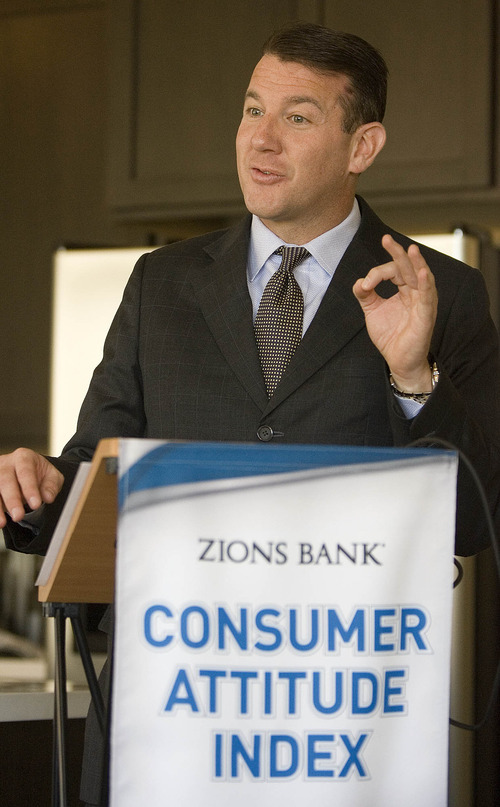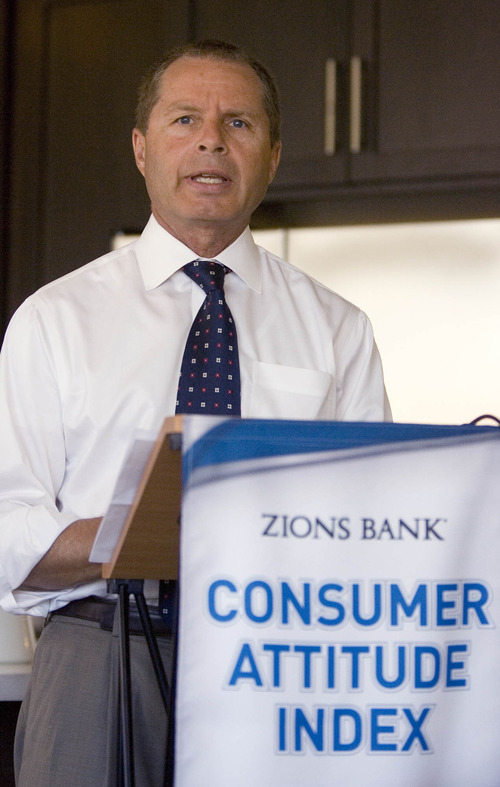This is an archived article that was published on sltrib.com in 2012, and information in the article may be outdated. It is provided only for personal research purposes and may not be reprinted.
The housing market along the Wasatch Front, beset by falling prices and scant demand, is sending up some green shoots of recovery, and that turned up in the latest Zions Bank index of consumer attitudes.
More than 80 percent of Utah consumers surveyed for the index earlier this month said they believe that prices for homes like theirs will stay the same or increase over the next 12 months, Zions said Tuesday.
The 15 percentage point increase from a year ago helped push the bank's Consumer Attitude Index up slightly, to 79.7 from 79 in May, while at the same time U.S. consumer confidence was falling for the fourth month in a row. The Conference Board said its Consumer Confidence Index fell to 62 from a revised 64.4 reading in May and was below the 63.2 that analysts were expecting.
Both the Utah and U.S. indexes remain below the 90 reading that indicates a healthy economy. The Conference Board's index hasn't been near 90 since the recession began in December 2007, but is far above the all-time low of 25.3 reached in February 2009. In Utah, the Zions index reached its highest point in April with a reading of 85.3. Since January, the index has averaged around 81.
Randy Shumway, CEO of The Cicero Group, which prepared the Zions index, said housing sales across the state were up 11.4 percent in the first four months of 2012, compared with the same time last year. In Salt Lake County, home sales were 16.6 percent higher in April and the average sales price moved up 3.7 percent, Shumway said.
"We've needed a [few] things to rebound to facilitate a full recovery," Shumway said. "One is the unemployment rate. A second is consumer spending. And a third is the housing market, [which] has been the most resistant to recovery for the last few years"
The picture is mixed, but overall unemployment in Utah has descended to 6 percent by the most recent count. Taxable retail sales were up 16 percent in March, according to the state Tax Commission. And "this year, we are beginning to see signs that the housing market may be rebounding," Shumway said.
That appears to be the case at Garbett Homes. The Salt Lake City's builder's sales of new homes this month are double what they were compared with a year ago, marketing director Rene Oehlerking said.
He added that Garbett broke ground on a 60-unit project in South Salt Lake last August. All were sold by April, even though just 20 houses have been built.
"We are seeing all of our homes being sold before they have even started construction. We haven't seen that since the housing bubble [in Utah] collapsed at the end of 2008," Oehlerking said.
What's more, prices are slowly rising. The average price of the homes sold at Garbett's TerraSol residential community was $240,000. Although that's down from what they would have sold for in 2007, it's the first time Garbett has been able to raise prices in three years, "and we are able to do that because of demand," Oehlerking said.
Even as consumer confidence was up slightly in June in Utah, confidence across the country fell for the fourth month in a row as lingering worries outweighed relief at the gas pump, according to the Conference Board.
The indicators are widely watched because consumer spending, including major items such as health care, accounts for 70 percent of U.S. economic activity. Americans are still worried about slow hiring, low home values, the stock market and a worsening European economy that some fear will hurt the U.S.
Worries about job and income growth seemed to weigh heavily on consumers in the U.S. survey, which is based on a poll conducted from June 1 through June 14 with about 500 randomly selected people nationwide.
Those stating jobs are "hard to get" increased to 41.5 percent from 40.9 percent, while those expecting more jobs in the months ahead declined to 14.1 percent from 15.4 percent. The proportion of consumers expecting an increase in their incomes declined to 14.8 percent from 15.7 percent.
Consumers' dwindling confidence follows a sharp slowdown in hiring in April and May. A measure of the number of people applying for unemployment benefits over the past month has reached a six month high, the government said last week. That increase suggests that layoffs are rising and June could be another lackluster month for hiring. The government is slated to release June data next week.
Shoppers are getting some relief at the gas pump. Prices have fallen from their peak in early April and were down 4 cents over the weekend to a national average of $3.41 per gallon, according to auto club AAA, Wright Express and the Oil Price Information Service. And experts say gas could fall another 11 cents by July 4.
Despite the positive signs, Americans appear to be hoarding cash, economists say. Several companies, from restaurants to home goods sellers, have recently said customers are pulling back on spending unless they are lured into stores by big discounts.
Bed Bath and Beyond last week forecast lower second-quarter earnings than analysts expected and said it needed to use more coupons to get people to spend. At furniture chain Ethan Allen Inc., executives said customer traffic is slowing and shoppers are taking more time to make purchasing decisions. And Darden Restaurants Inc., which operates Olive Garden and Red Lobster restaurants, expects earnings short of Wall Street expectations, and it said customers were turned off by the $1 increase for Red Lobster's dish "Festival of Shrimp."
The Associated Press contributed to this story —
Confidence builds, slowly
The Consumer Attitude Index in Utah, though volatile, is higher than last year. It takes a reading of 90 or above to indicate a healthy economy.
June 2011: 66.3
July: 69.3
August: 59.8
September: 70.7
October: 68.1
November: 67.7
December: 81.8
January 2012: 79.8
February: 84.8
March: 79.7
April: 85.3
May: 79
June: 79.7
Source: Zions Bank







